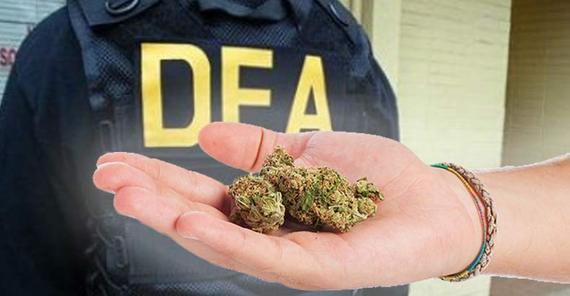Comments from DEA officials suggest that delta-8 THC may be legal after all

Cannabis operators who make or sell Delta-8 tetrahydrocannabinol (THC) are praying and hoping that U.S. Drug Enforcement Administration (DEA) officials will validate two recent comments regarding the cannabinoid’s legal status.
Cannabis advocates are urging the DEA to clarify comments that DEA liaison Sean Mitchell made during a recorded call in June with a Florida panel of hemp operators.
Mitchell reportedly said that “the only thing (in hemp) that is a controlled substance is delta-9 THC greater than 0.3 percent on a dry-weight basis.”
The comments were made amid rumors that state lines are preparing to outlaw the Delta-9 THC isomer. Issues pertaining to the legal status of D-8 were brought to light in state announcements discussing how rare and intoxicating THC isomers can be created from extracted CBD.
Aside from Mitchell’s comments, advocates are also drawing attention to a letter that was issued by the Alabama Board of Pharmacy in September. Lead officer of the the DEA’s Drug and Chemical Evaluation section, Terrence Boos, informed regulators that THC produced from “synthetically produced from non–cannabis materials” is a controlled substance.
Considering the fact that all D-8 THC products are usually converted from hemp-extracted CBD, many industry lobbyists believe that the Alabama letter hints towards the fact that D-8 is legal unless it is derived from “non-cannabis materials.”
What to know about Delta-8 THC
Similarly to the world-famous cannabinoid delta-9-tetrahydrocannabinol, delta-8-tetrahydrocannabinol is a mind-altering chemical that occurs naturally in the Cannabis plant.
Recognized as an isomer of delta-9, the psychotropic compound ∆⁸-THC is believed to harbor analgesic, antiemetic, anxiolytic, orexigenic, and neuroprotective properties.
Although its structure is much like delta 9 THC the location of a double bond between two carbons differs between D-8 and D-9. What’s more, the effects of D-8 tend to last longer and the isomer is favored for being much less intense than D-9.
Cannabis is still illegal at the federal level, but Delta-8 THC is legal because it contains less than 0.3 percent THC and is derived from hemp, which was legalized following the passing of the 2018 Farm Bill.
Delta-9 THC, on the other hand, is tighly restricted and is deemed to be a Schedule I controlled substance by the DEA.
Texas judge temporarily legalizes delta-8 THC
While budding business owners across the nation are waiting on tentertooks to find out whether or not the D-9 isomer is in fact legal or not, business owners in Texas are jumping for joy after a state judge temporarily legalized D-8 THC.
Previously outlawed in the state of Texas, D8 is legal again on a temporary basis. Widely popular with consumers of all ages, D8 can now be legally sold or obtained in Texas, where it will no longer be considered a felony offense.
A temporary injunction against the state’s previous D-8 THC laws was granted by state district court Judge Jan Soifer on Monday, November 1. The ruling occurred after an Austin-based CBD dispensary known as “Hometown Hero” urged the judge to ban the state from categorizing delta-8 as a Schedule I drug.
Based on the company’s argument, an injunction was necessary because retailers were not properly informed of D8’s illegal drug classification when the Texas Department of State Health Services’ (DSHS) issued an online notice on October 15.
As per the Travis County judge’s order, the DSHS failed to comply with the state’s rule-making conditions. It’s likely that the state will appeal against the ruling. However, no response was received from the DSHS when reporters reached out for comment.







